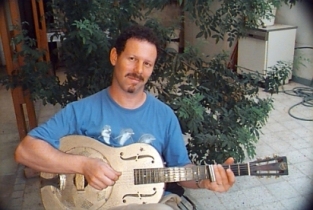Jessie Mae Hemphill's music has seen a revival in recent years due to the popularity of her hill country blues influences in the work of Daniel "Slick" Ballinger and Richard Johnston. Both artists are devotees of the lady from Senatobia, Mississippi. The Hemphill family, going back to her Great Grand Father was very influential in the development of this specific genre of northern Mississippi blues styles. Her grandfather, Sid Hemphill was featured of some the early recordings by Alan Lomax for the Library of Congress.
When Jessie Mae Hemphill was growing up, she came in contact with a large number of local and national musicians, whether in the Delta or in Memphis. She discovered Fred McDowell, from Como, Mississippi, as well as Johnny Woods, the harmonica player who sometimes accompanied him. In the 1960s, she mentioned McDowell to George Mitchell but McDowell had already started performing for the blues revival crowds by the time Mitchell reached him. Since she was a member of a renowned musical family she met many of the local musicians when they visited her grandfather, this was the case with Sonny Boy Williamson [Rice Miller]. When she was living in Memphis, she became friends with some of the best-known blues and rhythm-and-blues artists of the times: B.B. King, Albert King, Junior Parker, Robert Nighthawk, Muddy Waters and Howlin' Wolf. She remembered that one time, she and two other women -one piano player and one drummer- decided to play while B.B. King and his band were taking a break. They got on the stage, started playing, and the people in the club started dancing. The members of B.B. King's band did not dare return inside the club right away; they thought that the owner had hired another band because B.B. King and his musicians had taken a break which had lasted too long.
The instruments that Jessie Mae Hemphill played illustrated this stylistic and musical duality, the style of music she played, and the songs she composed and interpreted also underline this stylistic situation. Her instrument of choice on stage was the electric guitar that she played in what could be seen as a traditional adaptation of a modern instrument: she did not play extended solos or fast musical phrases. Instead, she used the guitar as a rhythm instrument by strumming or elaborating patterns to accompany her singing. It could be said that she used the guitar in a way similar to the drum found in the traditional fife-and-drum bands of the Delta, such as the bands that her great-grandfather and grandfather directed. She has also recorded tunes where she uses a tambourine attached to her foot or bells attached to her leg. In addition, she is known to have recorded at least one tune where she accompanies herself on the diddley bow (a horizontal piece of broom wire attached on the outside wall of a house, with two bottles serving as bridges that is played by striking the wire with a finger while sliding a small bottle or a piece of metal pipe on the length of the wire, in a manner similar to what is produced when a musician plays bottleneck guitar).
